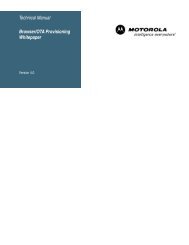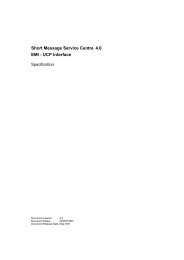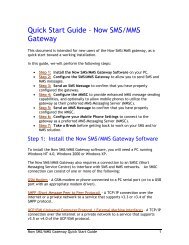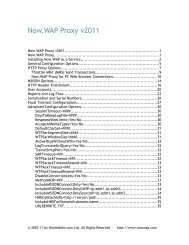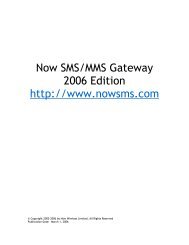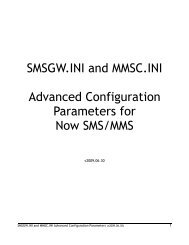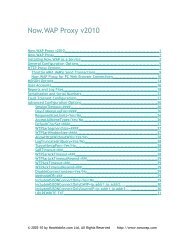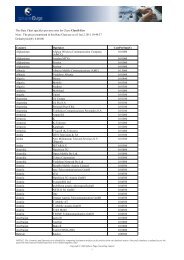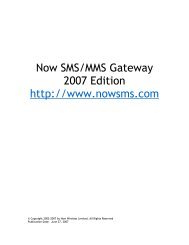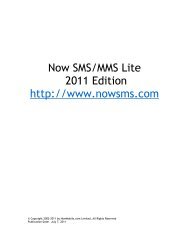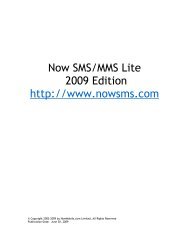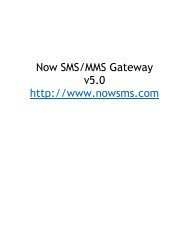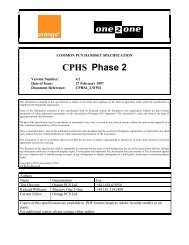a PDF version of this document. - Now SMS
a PDF version of this document. - Now SMS
a PDF version of this document. - Now SMS
You also want an ePaper? Increase the reach of your titles
YUMPU automatically turns print PDFs into web optimized ePapers that Google loves.
<strong>Now</strong><strong>SMS</strong> MMSC Diameter MM9 Implementation<br />
This <strong>document</strong> outlines how MMS charging is implemented using Diameter and MM9 in<br />
the <strong>Now</strong><strong>SMS</strong> MMSC. It also describes a test program that is used to validate proper<br />
Diameter configuration parameters and charging behaviour. MM9 Diameter charging is<br />
enabled in <strong>Now</strong><strong>SMS</strong> MMSC <strong>version</strong>s 2013.04.30 and later.<br />
The MMSC implements Diameter Credit Control for charging based upon the following<br />
specifications:<br />
• [DIAMBASE] – RFC 3588 – Diameter Base Protocol<br />
• [DIAMCCA] – RFC 4006 – Diameter Credit Control Application<br />
• [3GPPDIAM] – 3GPP TS 32.299 – 3GPP Diameter Charging Applications<br />
• [SCAPv2] – Ericsson CCN SCAPv2<br />
[3GPPDIAM] defines a standard format for implementing MMS charging over Diameter,<br />
known as MM9 in the MMS protocol specifications. While the MMSC preference is to<br />
use MM9, it is also possible to configure the MMSC to use generic charging<br />
primitives defined in [DIAMCCA] in order to facilitate interoperability with a<br />
wider base <strong>of</strong> charging systems.<br />
Optionally, Diameter extensions defined in Ericsson's [SCAPv2] protocol can be<br />
enabled.<br />
The MMSC Diameter MM9 implementation is highly configurable, with configuration<br />
settings that allow the Diameter requests to be tuned to meet the requirements <strong>of</strong><br />
different charging systems. The core Diameter charging requests use Credit-<br />
Control-Request as defined in [DIAMCCA]. Several extension sets are defined that<br />
provide additional Diameter parameters to be include in the charging request.<br />
For maximum flexibility, XML template files are used to define the underlying<br />
Diameter requests, allowing for custom parameters to be added or deleted as<br />
required.<br />
The MMSC generates two different Diameter requests, which are described in detail<br />
in <strong>this</strong> <strong>document</strong>.<br />
Capabilities-Exchange-Request is used to initiate the connection and identify that<br />
the connection is to be used for Diameter Credit-Control. In response, the MMSC<br />
expects to receive a Capabilities-Exchange-Answer that contains a Result-Code <strong>of</strong><br />
2001 to indicate success.<br />
Credit-Control-Request is used to provide details for an MMS charging operation.<br />
In response, the MMSC expects to receive a Capabilities-Exchange-Answer that<br />
contains a Result-Code <strong>of</strong> 2001 to indicate success. The MMSC will reject the MMS<br />
submission if any other Result-Code is received.
Capabilities-<br />
Exchange-Request<br />
AVP<br />
Code<br />
Protocol<br />
Usage Notes<br />
< Diameter Header > DIAMBASE Command-code = 257, REQ<br />
{Origin-Host} 264 DIAMBASE Configurable – Local Origin-Host<br />
name associated with MMSC<br />
{Origin-Realm} 296 DIAMBASE Configurable – Local Origin-Realm<br />
name associated with MMSC<br />
{Host-IP-Address} 257 DIAMBASE Configurable – Local IP address<br />
associated with MMSC<br />
{Vendor-ID} 266 DIAMBASE Value is 0, defined in DIAMBASE as<br />
indicating that the field should be<br />
ignored.<br />
{Product-Name} 269 DIAMBASE Value is MMSC<br />
{Auth-Application-ID} 258 DIAMBASE, Value is 4, as specified in DIAMCCA<br />
DIAMCCA<br />
{Acct-Application-ID} 259 DIAMBASE Value is 0<br />
{Supported-Vendor-ID} 265 DIAMBASE Value is 10415, the 3GPP code<br />
defined in 3GPPDIAM<br />
(If the request fails, the MMSC<br />
will try again without indicating<br />
support for <strong>this</strong> vendor ID.)<br />
{Supported-Vendor-ID} 265 Value is 193, the vendor ID code<br />
registered for Ericsson SCAP<br />
extensions.<br />
(If the request fails, the MMSC<br />
will try again without indicating<br />
support for <strong>this</strong> vendor ID.)
Credit-Control-<br />
Request<br />
AVP<br />
Code<br />
Protocol<br />
Usage Notes<br />
< Diameter Header > DIAMBASE Command-code = 272, REQ,<br />
Application-ID = 4<br />
{Session-Id} 263 DIAMCCA Dynamically generated<br />
{Origin-Host} 264 DIAMBASE Configurable – Local Origin-Host<br />
name associated with MMSC<br />
{Origin-Realm} 296 DIAMBASE Configurable – Local Origin-<br />
Realm name associated with MMSC<br />
[Destination-Host] 293 DIAMBASE Optional – Destination-Host name<br />
associated with charging server<br />
{Destination-Realm} 283 DIAMBASE Configurable – Destination-Realm<br />
name associated with charging<br />
server<br />
{Auth-Application-Id} 258 DIAMBASE,<br />
DIAMCCA<br />
{Service-Context-Id} 461 DIAMCCA,<br />
3GPPDIAM<br />
Value is 4, as defined in<br />
DIAMCCA<br />
Configurable – Default value is<br />
32270@3gpp.org as defined in<br />
3GPPDIAM to indicate MMS<br />
charging.<br />
When using generic DIAMCCA,<br />
other values may be required,<br />
such as SCAP_V.2.0@ericsson.com<br />
for Ericsson's SCAP.<br />
{CC-Request-Type} 416 DIAMCCA Value is EVENT_REQUEST<br />
{CC-Request-Number} 415 DIAMCCA Value is currently 0.<br />
Note that other values may be<br />
used in the future.<br />
{Event-Timestamp} 55 DIAMBASE Time <strong>of</strong> Charging Request<br />
{Subscription-Id}<br />
{Subscription-Id-Type}<br />
{Subscription-Id-Data}<br />
443<br />
450<br />
444<br />
DIAMCCA<br />
Group AVP contains Subscription-<br />
Id-Data and Subscription-Type.<br />
Subscription-Id-Data:<br />
MSISDN <strong>of</strong> the account (including<br />
country code).<br />
Subscription-Type:<br />
Value is 0 (END_USER_E164)<br />
{Requested-Action} 436 DIAMCCA Value is 0 (DIRECT_DEBITING)<br />
[3GPP-MS-TimeZone] 23 3GPPDIAM Value indicates the time-zone <strong>of</strong><br />
the MMSC.<br />
Required by Ericsson SCAPv2.<br />
This setting is included only if<br />
either the SCAP or 3GPPTIMEZONE<br />
Diameter extension set is<br />
enabled.<br />
[3GPP-SGSN-MCC-MNC] 18 3GPPDIAM Optional, included only if<br />
available to the MMSC, the SGSN<br />
MCC-MNC value can be used to<br />
detect roaming subscribers. See<br />
http://www.nowsms.com/operatormmsc-accounting-detectingroaming-subscribers
This setting is included only if<br />
available and the 3GPPSGSN<br />
Diameter extension set is<br />
enabled.<br />
[SGSN-ADDRESS] 1228 3GPPDIAM Optional, included only if<br />
available to the MMSC, the IP<br />
Address <strong>of</strong> the SGSN can be used<br />
to detect roaming subscribers.<br />
See<br />
http://www.nowsms.com/operatormmsc-accounting-detectingroaming-subscribers<br />
This setting is included only if<br />
available and the 3GPPSGSN<br />
Diameter extension set is<br />
enabled.<br />
[Service-Identifier] 439 DIAMCCA Optional, integer value.<br />
[Requested-Service-Unit]<br />
[CC-Money]<br />
[Unit-Value]<br />
[Value-Digits]<br />
[Exponent]<br />
[Currency-Code]<br />
[CC-Service-Specific-Units]<br />
437<br />
413<br />
445<br />
447<br />
429<br />
425<br />
417<br />
DIAMCCA<br />
Optional. Used only if generic<br />
DIAMCCA charging is being used.<br />
DIAMCCA allows for either a<br />
fixed price (with ISO 4217<br />
numeric currency code, e.g.,<br />
USD=840, EUR=978) or a service<br />
specific number <strong>of</strong> units<br />
associated with a Service-<br />
Identifier.<br />
MMSC will generate these fields<br />
if corresponding Requested-<br />
Service values are specified.<br />
In the case <strong>of</strong> CC-Money, MMSC<br />
expects a decimal format value<br />
and will generate Value-Digits<br />
and Exponent as appropriate.<br />
(For example, CC-Money = 0.25<br />
generates Value-Digits = 25 and<br />
Exponent = -2.)<br />
When configuring these settings,<br />
do not specify both CC-Service-<br />
Specific-Units and CC-Money.<br />
Specify either CC-Service-<br />
Specific-Units or CC-<br />
Money+Currency-Code.
Credit-Control-<br />
Request: 3GPP<br />
Extension Set<br />
[Service-Information]<br />
[MMS-Information]<br />
[Originator-Address]<br />
[Address-Type]<br />
[Address-Data]<br />
[Recipient-Address]<br />
[Address-Type]<br />
[Address-Data]<br />
[Submission-Time]<br />
[MM-Content-Type]<br />
[Type-Number]<br />
[Content-Size]<br />
[Message-ID]<br />
[Message-Type]<br />
[Message-Size]<br />
[Message-Class]<br />
[Class-Identifier]<br />
AVP<br />
Code<br />
873<br />
877<br />
886<br />
899<br />
897<br />
1201<br />
899<br />
897<br />
1202<br />
1203<br />
1204<br />
1206<br />
1210<br />
1211<br />
1212<br />
1213<br />
1214<br />
Protocol<br />
3GPPDIAM<br />
Usage Notes<br />
Contains grouped AVP values<br />
containing information about the<br />
MMS message, including<br />
originator and recipient.<br />
Parameter flag is set as<br />
optional, meaning the server can<br />
ignore if it does not understand<br />
<strong>this</strong> parameter. In that case,<br />
generic DIAMCCA Requested-<br />
Service-Unit parameters <strong>of</strong> money<br />
or units should be used.
Credit-Control-<br />
Request: SCAP<br />
Extension Set<br />
AVP<br />
Code<br />
Protocol<br />
Usage Notes<br />
{Traffic-Case} 1082 SCAPv2 Value is 20 (Originating<br />
Service).<br />
{Other-Party-Id}<br />
{Other-Party-Nature}<br />
{Other-Party-Data}<br />
{Other-Party-Type}<br />
1075<br />
1076<br />
1077<br />
1078<br />
SCAPv2 Recipient address.<br />
Nature = 1 (International)<br />
Type = 0 (END_USER_E164)<br />
[Service-Provider-Id] 1081 SCAPv2 Optional, configurable value.<br />
[Subscription-Id-Location] 1074 SCAPv2 Optional, configurable value.
MM9Test Program<br />
The MM9Test program is used to test and validate proper configuration parameters<br />
and charging behaviour by initiating a Diameter connection and sending a charging<br />
request for a single MMS message. The latest <strong>version</strong> <strong>of</strong> <strong>this</strong> program can be<br />
downloaded at http://www.nowsms.com/download/mm9test.zip.<br />
The MM9Test program generates the two Diameter requests detailed in <strong>this</strong> <strong>document</strong>:<br />
Capabilities-Exchange-Request and Credit-Control-Request.<br />
MM9TEST.EXE is a command line program. When run, MM9TEST.EXE will prompt for the<br />
following Diameter related configuration parameters:<br />
(Remote) Diameter Server Host Name or IP Address – The DNS host name or IP address<br />
<strong>of</strong> the Diameter charging server that will receive the connection.<br />
(Remote) Diameter Server Port Number – The port number for the Diameter server that<br />
will receive the connection.<br />
(Remote) Diameter Destination-Realm – The Destination-Realm parameter to be<br />
specified in the Diameter requests.<br />
(Local/Origin) Diameter Host-IP-Address – The IP address <strong>of</strong> the local host. This<br />
is a required property for the Capabilities-Exchange-Request.<br />
(Local) Diameter Origin-Host – The Origin-Host parameter to be specified in the<br />
Diameter requests.<br />
(Local) Diameter Origin-Realm – The Origin-Realm parameter to be specified in the<br />
Diameter requests.<br />
Service-Context-Id (optional) – A Service-Context-Id may be required by the<br />
charging server. The default is 32270@3gpp.org as defined in [3GPPDIAM] to<br />
indicate MMS charging. Ericsson's SCAPv2 requires a value <strong>of</strong><br />
SCAP_V.2.0@ericsson.com.<br />
Service-Identifier (optional) – Optional integer value to identify the service to<br />
the charging server.<br />
Requested-Service-Unit CC-Service-Specific-Units (optional) – [DIAMCCA] allows for<br />
charging based upon either a fixed price or a service specific number <strong>of</strong> units<br />
associated with a particular service. In most configurations, a value <strong>of</strong> 1 will be<br />
used for CC-Service-Specific-Units to indicate 1 MMS message being sent. If <strong>this</strong><br />
parameter is used, leave CC-Money and Currency-Code parameters blank.<br />
Requested-Service-Unit CC-Money (optional, use decimal format 1.23) – If used, <strong>this</strong><br />
indicates a fixed monetary charge to be applied for sending an MMS message. If<br />
<strong>this</strong> parameter is used, leave CC-Service-Specific-Units blank and specify a value<br />
for Currency-Code parameter.<br />
Requested-Service-Unit Currency-Code (optional, use ISO 4217 currency code) – When<br />
using a fixed monetary charge, <strong>this</strong> indicates the currency being used (e.g.,<br />
USD=840, EUR=978 ). If <strong>this</strong> parameter is used, leave CC-Service-Specific-Units<br />
blank and specify a value for CC-Money parameter.<br />
MMS Sender Phone Number – MSISDN to be charged for sending MMS message. Used to<br />
build Subscription-Id and Originator-Address in Credit-Control-Request.
MMS Recipient Phone Number – MSISDN receiving MMS message. Used to build<br />
Recipient-Address in Credit-Control-Request.<br />
3GPP-SGSN-MCC-MNC (optional) - If available to the MMSC, the SGSN MCC-MNC value can<br />
be used to detect roaming subscribers. If left blank, or not available, <strong>this</strong><br />
parameter is not included.<br />
SGSN-ADDRESS (optional) - If available to the MMSC, the SGSN-ADDRESS value can be<br />
used to detect roaming subscribers. If left blank, or not available, <strong>this</strong><br />
parameter is not included.<br />
Enable Ericsson SCAP Extension Set? (Y/N) – Answer Y to include the Credit-Control-<br />
Request parameters defined for the SCAP extension set. If selected, the program<br />
will prompt for additional optional parameters included in the SCAP extension set.<br />
SCAP parameter values prompted for include Service-Provider-Id, an integer value<br />
used to identify the service to the charging server, and Subscription-Id-Location.<br />
It is possible to use the 3GPP-SGSN-MCC-MNC value as the Subscription-Id-Location<br />
value by specifying a value <strong>of</strong> @@SGSNMCCMNC@@.<br />
Enable 3GPPTIMEZONE Extension Set? (Y/N) – This setting will automatically default<br />
to Y if the Ericsson SCAP Extension Set is enabled. Answer Y to include the 3GPP-<br />
MS-TimeZone parameter in the Credit-Control-Request.<br />
Enable 3GPP Extension Set? (Y/N) - Answer Y to include the Credit-Control-Request<br />
parameters defined for the 3GPP extension set (Service-Information/MMS-<br />
Information).<br />
If successful, the last line <strong>of</strong> output from the test program will read Diameter<br />
Result Code 2001.<br />
Raw Diameter packet information will be logged to MM9TEST.LOG. However, for easier<br />
troubleshooting, it is recommended that Wireshark be used to capture and log<br />
connection details. Wireshark will decode Diameter protocol information to more<br />
clearly report any protocol errors returned, as protocol errors typically relate to<br />
not having used the parameter values expected by the Diameter server.<br />
Important Usage Note: The MM9 Test Program saves previous responses, so these<br />
previous responses will be used as a default setting for the next test. To delete<br />
a prior response for an optionally included parameter, press the Space key, then<br />
Enter.<br />
For advanced requirements, the XML template files diameter-capabilitiesexchange.xml<br />
and diameter-credit-control.xml can be edited to modify Diameter<br />
parameters included in charging requests.<br />
After completing successful MM9 Diameter charging tests, the configuration settings<br />
used by the test program can be easily migrated to production MMSC settings.<br />
MM9 test settings are saved in a file named MM9TEST.INI. Copying the entire<br />
[MM9Diameter] section <strong>of</strong> MM9TEST.INI to MMSC.INI will activate MM9 Diameter<br />
charging in <strong>Now</strong><strong>SMS</strong> MMSC <strong>version</strong>s 2013.04.01 and later.
MM9 Diameter Charging in the MMSC<br />
MM9 Diameter charging is enabled in <strong>Now</strong><strong>SMS</strong> MMSC <strong>version</strong>s 2013.04.30 and later by<br />
configuring parameters under an [MM9Diameter] section header <strong>of</strong> MMSC.INI. It is<br />
recommended that the MM9TEST.EXE utility be used to initially define these<br />
settings. MM9 test settings are saved in a file named MM9TEST.INI. Copying the<br />
entire [MM9Diameter] section <strong>of</strong> MM9TEST.INI to MMSC.INI will activate MM9 Diameter<br />
charging.<br />
The following settings are supported in <strong>this</strong> [MM9Diameter] section:<br />
Destination-Host-Address - The DNS host name or IP address <strong>of</strong> the Diameter charging<br />
server that will receive the connection.<br />
Destination-Host-Port-Number – The port number for the Diameter server that will<br />
receive the connection.<br />
Host-IP-Address – The IP address <strong>of</strong> the local host. This is a required property<br />
for the Capabilities-Exchange-Requst.<br />
Origin-Host – The Origin-Host parameter to be specified in the Diameter requests.<br />
Origin-Realm – The Origin-Realm parameter to be specified in the Diameter requests.<br />
Product-Name – The Product-Name parameter to be specified in the Capabilities-<br />
Exchange-Requst. The default value is MMSC.<br />
Destination-Realm - The Destination-Realm parameter to be specified in the Diameter<br />
requests.<br />
Service-Context-Id – A Service-Context-Id may be required by the charging server.<br />
The default is 32270@3gpp.org as defined in [3GPPDIAM] to indicate MMS charging.<br />
Ericsson's SCAPv2 requires a value <strong>of</strong> SCAP_V.2.0@ericsson.com.<br />
Service-Identifier – Optional integer value to identify the service to the charging<br />
server.<br />
CC-Service-Specific-Units – [DIAMCCA] allows for charging based upon either a fixed<br />
price or a service specific number <strong>of</strong> units associated with a particular service.<br />
In most configurations, a value <strong>of</strong> 1 will be used for CC-Service-Specific-Units to<br />
indicate 1 MMS message being sent. If <strong>this</strong> parameter is used, leave CC-Money and<br />
Currency-Code parameters blank.<br />
CC-Money – If used, <strong>this</strong> indicates a fixed monetary charge (e.g., 0.05) to be<br />
applied for sending an MMS message. If <strong>this</strong> parameter is used, leave CC-Service-<br />
Specific-Units blank and specify a value for Currency-Code parameter.<br />
Currency-Code – When using a fixed monetary charge with CC-Money, <strong>this</strong> indicates<br />
the currency being used (e.g., USD=840, EUR=978). If <strong>this</strong> parameter is used, leave<br />
CC-Service-Specific-Units blank and specify a value for CC-Money parameter.<br />
Service-Provider-Id - An integer value used to identify the service to the charging<br />
server when the SCAP extension set is enabled.<br />
Subscription-Id-Location – A string value required by the SCAP extension set. It<br />
is possible to use the 3GPP-SGSN-MCC-MNC value as the Subscription-Id-Location<br />
value by specifying a value <strong>of</strong> @@SGSNMCCMNC@@.
EmailAddressNumber – Some charging environments may not be able to accept an e-mail<br />
address as a recipient. For those environments, specify a phone number to be<br />
substituted in Diameter charging requests for MMS messages to e-mail recipients.<br />
MultipleRecipCharge – By default, the MMSC issues a separate charging request for<br />
each recipient when an MMS message is sent to multiple recipients. When <strong>this</strong><br />
parameter is set to Yes, the MMSC issues a single charging request for multiple<br />
recipients, multiplying CC-Service-Specific-Units or CC-Money by the number <strong>of</strong><br />
recipients automatically.<br />
SupportedExtensionSets – A comma delimited list <strong>of</strong> extension sets enabled for the<br />
Diameter connection. Extension sets are detailed below:<br />
SCAP – Enables Diameter parameters defined by [SCAPv2], including Traffic-<br />
Case, Other-Party-Id, Service-Provider-Id and Subscription-Id-Location. Also<br />
enables 3GPP-MS-TimeZone.<br />
3GPPTIMEZONE – Enables 3GPP-MS-TimeZone.<br />
3GPPSGSN – Enables 3GPP-SGSN-MCC-MNC and SGSN-ADDRESS, if available to the<br />
MMSC.<br />
3GPP – Enables Service-Information/MMS-Information grouped parameters<br />
providing MMS message detail.
Enabling MM9 Diameter for Only Select<br />
Subscribers<br />
In some environments, it may be desirable to use MM9 Diameter charging for only<br />
some subscribers. For example, MM9 Diameter charging might only be used for<br />
prepaid subscribers.<br />
In other environments, it may be desirable to use different Diameter charging<br />
servers for different groups <strong>of</strong> customers (for example, when the MMSC is hosting<br />
subscribers from multiple countries, or multiple MVNOs).<br />
Both <strong>of</strong> these scenarios are facilitated through accounting callbacks, which are<br />
<strong>document</strong>ed at http://www.nowsms.com/doc/advanced-configuration-settings/mmsaccounting-callbacks.<br />
The MMSSend PreAuth callback can return a response indicating that a Diameter<br />
charge should be attempted.<br />
In <strong>this</strong> scenario, CallbackTriggerOnly=Yes should be added to the [MM9Diameter]<br />
section <strong>of</strong> MMSC.INI to indicate that the MMSC should only generate Diameter charges<br />
if directed to do so by the response to the MMSSend PreAuth callback. The callback<br />
response should include the text MM9Diameter=Yes to indicate that a Diameter charge<br />
is required for the transaction.<br />
Multiple Diameter servers can be configured by creating additional sections in<br />
MMSC.INI, similar to the [MM9Diameter] section <strong>document</strong>ed here. Use a section name<br />
<strong>of</strong> [MM9Diameter-xxxxxxxx] where xxxxxxxx is a name to be associated with <strong>this</strong><br />
Diameter server. The MMSSend PreAuth callback response can trigger a Diameter<br />
charge to <strong>this</strong> server by including MM9Diameter=xxxxxxxx in the text <strong>of</strong> the<br />
response. (MM9Diameter=Yes triggers a charge for the server defined in<br />
[MM9Diameter]. Values other than Yes trigger a charge for a different Diameter<br />
server.)
MM9 Diameter XML Templates<br />
The XML template files used for Diameter charging in the MMSC are not fully<br />
<strong>document</strong>ed at <strong>this</strong> time. It is recommended that any edits be made to these<br />
templates only after consulting with <strong>Now</strong><strong>SMS</strong> MMSC Technical Support.<br />
diameter-capabilities-exchange.xml:<br />
<br />
<br />
<br />
<br />
<br />
<br />
<br />
<br />
<br />
<br />
<br />
<br />
<br />
<br />
<br />
<br />
<br />
<br />
<br />
<br />
<br />
<br />
<br />
<br />
<br />
<br />
<br />
<br />
<br />
<br />
<br />
<br />
<br />
<br />
<br />
<br />
<br />
(Repeated sections show multiple attempts to be made if the previous attempt did<br />
not succeed.<br />
diameter-credit-control.xml:<br />
<br />
<br />
<br />
<br />
<br />
<br />
<br />
<br />
<br />
<br />
<br />
<br />
<br />
<br />
<br />
<br />
<br />
<br />
<br />
<br />
<br />
<br />
<br />
<br />
<br />
<br />
<br />
<br />
<br />
<br />
<br />
<br />
<br />
<br />
<br />
<br />
<br />
<br />
<br />
<br />
<br />
<br />
<br />
<br />
<br />
<br />
<br />
<br />
<br />
<br />
<br />
<br />
<br />
<br />
<br />
<br />
<br />
<br />



